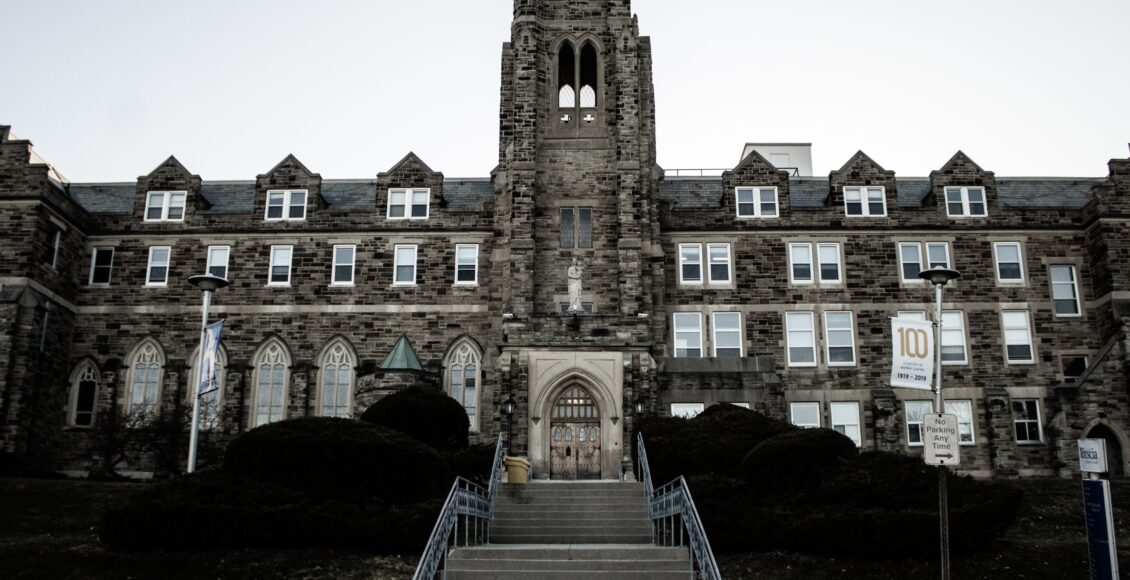The Extinction of the Women’s College: Is Brescia’s Closure a Feminist Move?
As women’s post-secondary enrolment now surpasses men’s, many argue that there is no longer a need for women's colleges in Canada. Why does Brescia’s closure tell us otherwise?
 https://www.pexels.com/photo/church-tower-with-steps-to-the-doorway-3622746/
https://www.pexels.com/photo/church-tower-with-steps-to-the-doorway-3622746/
Is closing the last women’s college in Canada as progressive as it sounds? On September 21st, 2023, the presidents of Western and its affiliate institution, Brescia College, announced their decision to fully integrate the women’s only school into the main campus. Citing “having to adapt to new realities,” Brescia will end its 104-year-long legacy and close its doors in May 2024 as the last women-only college in Canada. Such a decision will require moving over 1500 students and staff to relocate with little warning. The Brescia community called out Western for failing to properly consult or warn its 1500 students and faculty associations. Heather Kirk, the VP of the Faculty Association at Brescia, explains that students and staff “were blindsided by the lack of consultation and the sudden nature of the decision only two weeks into term.” Western’s explanatory statement mentions that women outnumber men in most of their faculties as one of the reasons for Brescia’s closure, but is this a justifiable reason to close the college? Students who attend Brescia disagree. After extensive interviews with Brescia students and faculty members, it is evident that such a decision was not made for the sake of “progressive feminism” but instead reflects a trend of Canadian Universities prioritizing profit over student well-being. Closing Brescia College may financially benefit Western but poses much greater implications for feminism in Canadian academia.
What makes Brescia unique? Kirk explained that “many students come to Brescia for its smaller campus size, class sizes that are on average between 14-30 students, and less hierarchical relationships between students and professors”. First-year students Emma McBean and Alex Wild explained that Brescia’s women-only campus provides unique opportunities and support they can’t find elsewhere. Emma explained that “[Women] have a community here, they’re losing all of that. It’s a daunting and suffocating feeling knowing that they won’t have access to that space anymore”. Brescia is an important space that allows women with disabilities or children to seek extra help, support and resources as they acquire their degrees. One example is Brescia’s specialized mental health initiative, “Care Program,” which allows faculty members to submit a “care concern” on behalf of students and has been a key resource in her educational journey. An interviewee by the name of Sabrina Rastin argues that such a program “saved her education” following a loss in her family. She has heard nothing about the transferring of that service to Western, which is something that deeply concerns her. McGill Professor Derek Silva, who is a visiting Fellow from Western, argues that “Students will simply not get the same type of education at Western.”

Heather Kirk explains that the Faculty Association was not consulted, nor was the Brescia Council, the collegiate governing body. She is worried about job security for both faculty and staff, as well as the personal well-being and academic success of students. She and her colleagues were promised that full-time faculty members would be offered positions at Western, but “similar guarantees can’t be made to my contract faculty colleagues…to eliminate a local employer and leave some 60-70 people with fewer opportunities for work is troubling.”
This raises a crucial question: If staff and students do not want the closure of Brescia and are receiving no benefits, who is? A CBC article reported that the facilities at Brescia will be converted into a preparatory school that will aim to “…help international and domestic students build English-language skills and cultural support ahead of future studies.” A $25 million Legacy Fund will be established to support access to the new program through scholarships and bursaries. Silva explains that “On the surface, this sounds great as it would serve students from equity-deserving groups,” but he believes that “such preparatory programs are used as recruitment strategies for international students who pay much, much, much higher tuition than domestic students.” The merger statement mentions that the program will aim to enhance educational outcomes for equity-deserving groups; however, there are no details outlining how they plan to do so. While there is a constant need to change and adapt educational opportunities for student bodies, why does this change have to jeopardize the existence of an institution that has served women well for over 100 years?
Feminism is about choice. Telling students they no longer have access to smaller class sizes, additional support and resources, and ultimately a safe campus is taking away their right to choose the educational path that’s right for them. Is it really feminist to take away spaces that women want and need? Kirk also warns us of the loss of inclusive spaces for women of all kinds of backgrounds, “The loss isn’t quantifiable when I think of women and gender-diverse students trying to find a space where they belong, where they can succeed and thrive within a close, supportive community. Women’s only education has worked well for 104 years: it’s only ending now because of finances, not lack of relevance.” Some argue that creating separate spaces for men and women is not conducive to equality; however, to assert this overlooks the fact that all students must have the right to access education in a safe environment. Students should not be blamed for fearing integration into Western: How are women supposed to feel safe when there were reports of 30 girls drugged in residence in one night during Frosh 2022? Recent sexual assault scandals at Western make it a rougher transition than it has to be.

There are various reasons that students continue to seek women-only institutions. Some seek closer sisterhood relations, and many require accessibility and resource options that aim to keep women’s needs in mind. Brescia is so much more than a women’s college. It’s a space where, for over 100 years, women have built solidarity and studied in an environment that caters to their individual needs. In the end, this college closure demonstrates that cutting women’s programs for the sake of university development is not truly a “progressive move” but rather improves one program at the cost of another. If this is a sacrifice that is truly beneficial to the Western community as a whole, why must the improvement of one program come at the cost of another?
Edited by Anna-Sophia Everett.
Featured image licensed under Pexels.com CC BY 2.0
